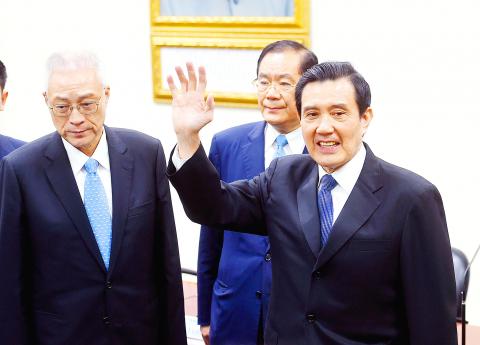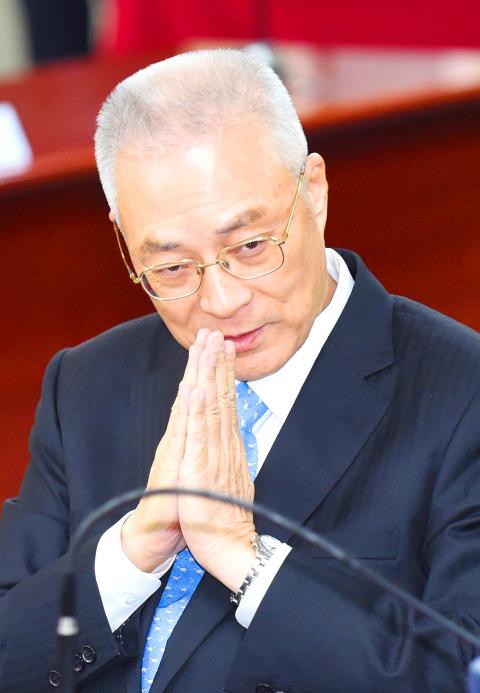President Ma Ying-jeou (馬英九) resigned as Chinese National Party (KMT) chairman yesterday at a meeting of the party’s Central Standing Committee, following the KMT’s unprecedented loss in the nine-in-one elections on Saturday.
Vice President Wu Den-yih (吳敦義), who is one of the KMT’s seven vice chairpeople, became the party’s acting chairman until one is elected.
After naming Wu acting chairman, the committee made vice chairperson Hung Hsiu-chu (洪秀柱), who is also legislative deputy speaker, secretary-general of the KMT.

Photo: Fang Pin-chao, Taipei Times
The KMT shakeup comes four days after voters dealt the ruling party a resounding defeat on Saturday, a fact Ma addressed in his resignation speech:
“First of all, I want to thank all the voters for their performance in these democratic elections. Every ballot represents the love that citizens have for Taiwan, and the poll results have reminded us that those in power must also be humble listeners,” he told the meeting.
“The KMT met unprecedented defeat in these elections. As party chairman, I have to apologize to all the supporters that I have disappointed,” he said. “To take responsibility for this, I am here to announce my resignation as KMT chairman.”

Photo: Liu Hsin-de, Taipei Times
Ma bowed deeply in apology for more than 10 seconds and said that the election results show that “our [the KMT’s] reforms have not occurred fast enough to meet the public’s expectations.”
Including yesterday’s meeting, Ma has now apologized three times for the party’s thrashing. Ma apologized for the KMT’s defeat on the day of the elections, but did not announce that he would be stepping down as chairman. Premier Jiang Yi-huah (江宜樺) and KMT Secretary-General Tseng Yung-chuan (曾永權), on the other hand, did announce their respective resignations on that day in response to the party’s showing.
However, the next day, it was reported that Ma would resign at the meeting that the committee holds every Wednesday.
At the party’s regular closed-door meeting on Tuesday, Ma apologized again and said that the public’s expectations have outpaced the KMT’s reforms, according to a press release.
He also said that while the party had lost this time, “we firmly believe that the country’s overall approach has not been a failure, nor has the direction liberalization reform has taken.”
Former KMT legislator Chang Sho-wen (張碩文), who was part of defeated KMT Taipei mayoral candidate Sean Lien’s (連勝文) campaign team, lashed out at Ma’s “reluctant resignation,” saying it was tendered “at the wrong time and with the wrong attitude.”
Chang said that Ma should have accompanied his announcement with an acknowledgement of his “false leadership,” but had instead insisted that the direction his reforms took was the correct one.
Chang also questioned why an outgoing chairman had the right to appoint the party’s acting chairman and secretary-general.
“Real reform would be to respect the institution [the party] and return power to the Central Standing Committee — the most powerful body within the party — instead of pulling strings behind the scenes,” Chang said, seeming to imply that the committee’s appointments for both roles had been made in accordance with Ma’s wishes.

DAREDEVIL: Honnold said it had always been a dream of his to climb Taipei 101, while a Netflix producer said the skyscraper was ‘a real icon of this country’ US climber Alex Honnold yesterday took on Taiwan’s tallest building, becoming the first person to scale Taipei 101 without a rope, harness or safety net. Hundreds of spectators gathered at the base of the 101-story skyscraper to watch Honnold, 40, embark on his daredevil feat, which was also broadcast live on Netflix. Dressed in a red T-shirt and yellow custom-made climbing shoes, Honnold swiftly moved up the southeast face of the glass and steel building. At one point, he stepped onto a platform midway up to wave down at fans and onlookers who were taking photos. People watching from inside

A Vietnamese migrant worker yesterday won NT$12 million (US$379,627) on a Lunar New Year scratch card in Kaohsiung as part of Taiwan Lottery Co’s (台灣彩券) “NT$12 Million Grand Fortune” (1200萬大吉利) game. The man was the first top-prize winner of the new game launched on Jan. 6 to mark the Lunar New Year. Three Vietnamese migrant workers visited a Taiwan Lottery shop on Xinyue Street in Kaohsiung’s Gangshan District (崗山), a store representative said. The player bought multiple tickets and, after winning nothing, held the final lottery ticket in one hand and rubbed the store’s statue of the Maitreya Buddha’s belly with the other,

Japan’s strategic alliance with the US would collapse if Tokyo were to turn away from a conflict in Taiwan, Japanese Prime Minister Sanae Takaichi said yesterday, but distanced herself from previous comments that suggested a possible military response in such an event. Takaichi expressed her latest views on a nationally broadcast TV program late on Monday, where an opposition party leader criticized her for igniting tensions with China with the earlier remarks. Ties between Japan and China have sunk to the worst level in years after Takaichi said in November that a hypothetical Chinese attack on Taiwan could bring about a Japanese

‘COMMITTED TO DETERRENCE’: Washington would stand by its allies, but it can only help as much as countries help themselves, Raymond Greene said The US is committed to deterrence in the first island chain, but it should not bear the burden alone, as “freedom is not free,” American Institute in Taiwan Director Raymond Greene said in a speech at the Institute for National Defense and Security Research’s “Strengthening Resilience: Defense as the Engine of Development” seminar in Taipei yesterday. In the speech, titled “Investing Together and a Secure and Prosperous Future,” Greene highlighted the contributions of US President Donald Trump’s administration to Taiwan’s defense efforts, including the establishment of supply chains for drones and autonomous systems, offers of security assistance and the expansion of